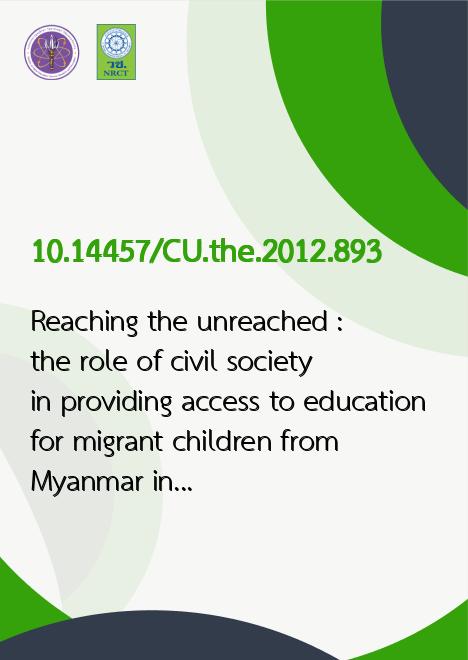
|
Reaching the unreached : the role of civil society in providing access to education for migrant children from Myanmar in Thailand |
|---|---|
| รหัสดีโอไอ | |
| Title | Reaching the unreached : the role of civil society in providing access to education for migrant children from Myanmar in Thailand |
| Creator | Stenbeck, Kristine Misvaer |
| Contributor | Theera Nuchpiam, Supang Chantavanich |
| Publisher | Chulalongkorn University |
| Publication Year | 2555 |
| Keyword | Education, Marginality, Social, Burmese -- Thailand, เด็กด้อยโอกาส, การอพยพ, การศึกษา, ชายขอบทางสังคม, ชาวพม่า -- ไทย |
| Abstract | The aim of the thesis is toexamine the current educational situation for Burmese migrant children in Thailand; and to analyse the different roles NGOs play, including the possible collaboration between local authorities, public schools and NGOs. Despite international agreements and national policies there are numerousmarginalized people without access to schools; no education has individual as well as collective consequences; and studies have shown that through cooperation between national authorities and NGOs can these children fully gain access to schools. Findings report a growing number of migrant children enrolling in either learning centers or a public school. Local authorities support, to a certain degree, with teacher training, curriculum development and network meetings; while NGOs and public schools cooperate in improving the children’s language skills. NGOs fill an educational gap for migrant children due tolack of engagement from authorities.Yet research discovers a great diversity in quality, opportunities and collaboration between the three provinces studied. Awareness of these children’s situation and needs is missing; the importance of providing education is not fully recognized and it is a deficiency of policy implementation. Nonetheless the responsibility for this inadequacy does not only rely on what the authorities are carrying out. There are also faults amongst public schools and NGOs; hence, there are several factors that acquire enhancement for future administration of the Thai education services; and quality of accommodation for migrants. Neither the pace of the process, nor the magnitude of educational opportunities provided Burmese migrant children today, are sufficient. This study suggests advanced capacity building, increasing awareness and enhancing progress as means to improve future access to education for Burmese migrant children. |
| URL Website | cuir.car.chula.ac.th |